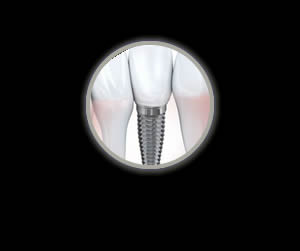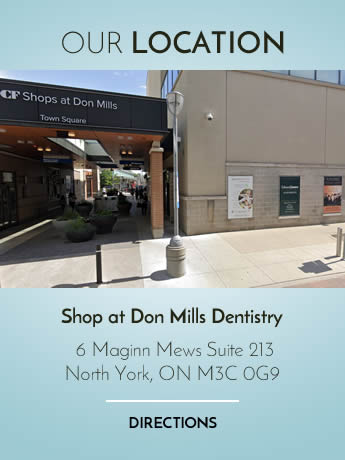At Shops at Don Mills Dentistry we offer dental implants to improve our patients’ oral health and smile. Dental implants can improve our patients’ overall health, while helping them gain the confidence that comes from a well-functioning smile that looks good and feels natural. Dental implants placed by our expert implant dentist might be the right solution for you, we encourage you to contact us to schedule an initial consultation to see if you are a candidate for dental implants.
Dental Implants: Modern Replacements for Missing Teeth
An accident, injury, or disease can cause tooth loss. Having an incomplete smile may damage your self esteem and cause oral health problems. Without a replacement tooth, the remaining teeth shift and the bone can start to deteriorate. Dental implants can replace missing teeth and allow patients to lead the full, active lives they deserve.
What are Dental Implants?
A dental implant is an artificial tooth root which acts as an anchor for replacement teeth. Shaped like a screw, it is surgically placed into the jawbone to secure a replacement tooth or bridge in place. Stable and permanent, implants do not rely on neighboring teeth for support. They are an ideal tooth replacement procedure because they look and feel like natural teeth. Studies show that dental implants have a 95 percent success rate in most cases.
Why Choose Implants
Implants are great for patients who are unable to wear dentures. Instead, the dentist will place the implant directly into the jawbone to support permanently cemented bridges. Implants can be made from several different types of metallic and bone-like ceramic materials that are compatible with body tissue. When surgically anchored into the jawbone, the implant fuses with living bone in a process known as “osseointegration”. After your mouth heals, usually in three to six months, your doctor will place a permanent crown over the post to complete your smile restoration.
FAQs about Dental Implants
Do I really need to replace one tooth?
A missing tooth leaves a gap in your smile, which can make you feel self conscious about your appearance. As well, even one lost tooth can damage your oral health by causing other oral health problems. Dental implants can replace one tooth or the whole mouth full, giving you back a solid, healthy smile.
Am I a candidate for implants?
For successful implant placement, you need to be in good overall health, have good dental health, and sufficient bone structure. We will perform a full evaluation to see if dental implants would fit your personal situation.
How do I care for my implants?
Treat your implants like you would your natural teeth. Brush at least twice a day, floss regularly, and schedule routine checkups with the dentist. Following these steps will make for successful implant therapy and a gorgeous smile.
What are implant-supported dentures?
If you are not a candidate for dental implants to replace all your teeth, your dentist may recommend implant-supported dentures, which will create a more secure situation with your dental appliance. With implant-supported dentures, several titanium posts are placed in your jaw bone so that the denture can snap on to the implants, reducing slippage and improving comfort.
How much do dental implants cost?
Because each case is unique, it is impossible to estimate the cost of implants until you meet with your dentist. After a complete exam, your doctor will explain the findings and review treatment options, which will include the cost of the implants.
BONE GRAFTING
Bone grafting is a procedure that treats and restores the loss of jawbone material. Good jawbone density is necessary for natural teeth retention and for proper foundation for dental implants. However, a patient\’s jawbone can deteriorate for a number of reasons, such as periodontal disease and lack of stimulation of the jawbone material. The most common cause of jawbone deterioration is when a tooth is extracted and a replacement is not installed in its place. Over time, patients wearing unanchored dentures may experience jaw bone resorption. Wearers of dental bridges can experience deterioration of the bone structure beneath the missing teeth. Avoiding dental extractions unless absolutely necessary is the best way to preserve jaw bone density.
There are several types of bone grafts currently available:
1. Autogenous Bone Graft – This grafting material is transplanted from one area to another within the same individual. Chin bone or bone material from behind the wisdom teeth are often used. This is the most ideal type of graft because the bone material is living tissue that enhances bone growth. This type of graft has the best success rate because the chances of tissue rejection are minimized.
2. Allograft Bone Graft – The grafting material is from human donor bone (cadaver). This bone material undergoes strict disinfecting processes in order to render it safe for transplant.
3. Xenograft Bone Graft – The grafting material comes from an animal source, such as bovine.
4. Alloplast Bone Graft – The grafting material is made from a synthetic substance that is compatible with the human body.
The grafting process:
The surgeon first evaluates the extent of bone deterioration in the areas where bone grafting is necessary. The donor bone is affixed to the surgical site. The dentist may also use a compound of crushed bone where necessary. Over time the bone will regenerate. Healing time depends upon the extent of bone loss and the type of replacement filler material used. Usually in one year’s time the patient will have sufficient bone material to be a candidate for dental implants.





